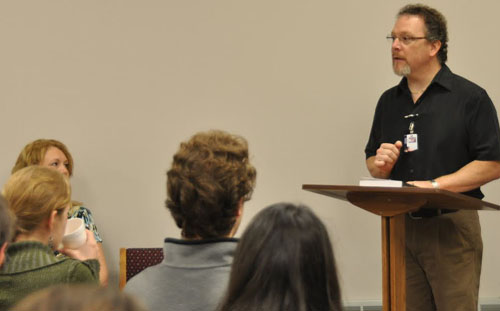The Long Journey Home
In Conversation with Andrew Schmutzer
An interview with Andrew Schmutzer about The Long Journey Home: Understanding and Ministering to the Sexually Abused, and part 1 of his chapter, “A Theology of Sexuality and its Abuse: Creation, Evil, and the Relational Ecosystem” as appearing in Pneuma Review Summer 2013.
Note from the Editors: Beginning a conversation about sexual abuse is uncomfortable, but we feel strongly that this topic is something the church needs to address. We believe the testimonies of authentic recovery can help us embrace the pain of the hurting and make openings for God to bring healing.
Pneuma Review: Are seminaries preparing church leaders to deal with sexual abuse?
Andrew Schmutzer:

Andrew J. Schmutzer discussing The Long Journey Home in 2011, by Lulu Hé. Courtesy of Moody Bible Institute.
Historically, no; but some are now trying. Abuse trauma is not simple and trying to train for the complexity of abuse—something that wasn’t even discussed in churches 15 years ago—begins to show the magnitude of this challenge. Seminaries need to start offering (requiring?) courses on a theology of sexuality and its legal and pastoral implications. Academic programs need far more team-teaching from different professionals. Just bringing in a survivor for the class to interact with would make a serious contribution toward pastoral preparation. Issues in sexuality are utterly exploding on so many fronts today: from gender-bending among youth and same-sex “rights” to the ever-present plague of sexual abuse. There are many expectations on our seminaries, and pastors are pulled in so many directions already, I understand that. But sexual abuse is a bleeder that must be tied off immediately. To be ill-equipped and ignorant of sexual abuse today is like living in tornado alley with no alarm system. It’s unacceptable. It’s a disaster itself.
More particularly, we’re going to have to network more between organizations, and frankly, embrace a more holistic anthropology that moves beyond the protracted gender wars and fear of therapy. More aggressive study of relational patterns (e.g., Family Systems Theory) and how power is heard and felt by victims is a practical issue that will have to be woven into standard leadership training and core curriculum—internships may need to become more apprentice-like. There is a complexity to the human-induced trauma of sexual abuse we’re only beginning to face. Unlike some addictions, one doesn’t choose to be a victim of sexual abuse, but the way we process this has not caught up to the complexities we’re now learning about how complex PTSD and mental health affect the entire person. Pastors need to understand: (1) the multi-factorial backdrop of sexual abuse (e.g., beliefs about sex, toxic family traditions, superficial healing rituals, cultural modes of thinking, etc.), (2) and the complex reasons that victims often go on to abuse others (i.e., trans-generational sexual abuse). Specialized training might need to look like continuing education classes or periodic seminars. It should go without saying, but church leaders need to stop avoiding passages in Scripture that address sexual perversion, rape, and standard biblical ethics.
Category: Ministry, Summer 2013


